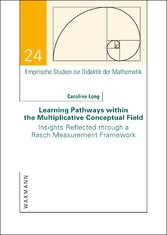Suchen und Finden
Service
Learning Pathways within the Multiplicative Conceptual Field - Insights Reflected through a Rasch Measurement Framework
Mehr zum Inhalt

Learning Pathways within the Multiplicative Conceptual Field - Insights Reflected through a Rasch Measurement Framework
The transition from whole numbers to rational numbers and the associated mastery of the multiplicative conceptual field constitute an important development in lower secondary schooling. This study draws primarily on the theory of conceptual fields as a framework that is mathematical and enables a cognitive perspective by identifying the concepts- and theorems-in-action that lead to underlying concepts and theorems.
Application of the Rasch model configures the location of both item difficulty and learner proficiency on one scale. Diagnostics explore the validity of the instrument for measurement. The ordering of items enables the analysis of hierarchical conceptual strands and additional insights into the mastery of concepts by subsets of learners at particular levels. The resulting matrix, of interactions of learner proficiency and item complexity, provides an overview of the concepts attained and not yet mastered. These insights permit teacher interventions specific to each learner subset at a shared common current zone of proximal development along the scale.
Caroline Long has received her doctorate in Mathematics Education from the University of Cape Town in 2011 and is Senior Lecturer in the Faculty of Education at the University of Pretoria, where she is responsible for teaching mathematics education courses, and modules on assessment. She is also Deputy Director at the Centre for Evaluation and Assessment. Her primary research foci are mathematics education, professional development, teacher agency and assessment. Current work relies on collaboration with researchers at other South African institutions, and in Australia, Canada, England, Germany, India, the Netherlands, Scotland and the USA.
Alle Preise verstehen sich inklusive der gesetzlichen MwSt.








